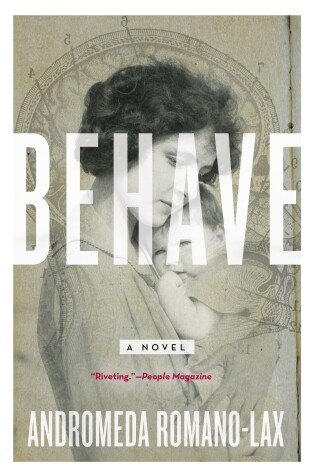Reviewed by gmcgregor on
The researcher conducting that experiment (which could never be conducted today) was John Watson, a prominent behaviorist, with his assistant Rosalie Rayner. Andromeda Romano-Lax's Behave is a fictional account of Rosalie's life, beginning just before she graduates from Vassar with a degree in psychology and continuing through her time as a research assistant in Watson's lab and her relationship with John, first as his paramour and then as his wife and mother of their children. Children who are expected, of course, to be raised according to their father's behaviorist principles. Before she could actually finish raising those children, though, Rosalie died of dysentery in her mid-thirties.
Rosalie's story is an interesting one to tackle, because she was both a serious scientist at a time when it was possible but difficult to be a female scientist and a subject of tabloid gossip when she was named as a co-respondent in John's divorce from his first wife. The affair led to John's firing from Johns Hopkins, where Rosalie had been working with him while she pursued a graduate degree in psychology. The notoriety caused a hitch in his professional life, but completely destroyed hers. Even as their lives move away from professional psychology, though, the specter of Little Albert haunts them. Behave reminded me a little of The Group...not just because it's also set in part at Vassar (about 15 years earlier), but because they both deal with the struggles of intelligent, educated women to be all they want to be in a society that's not really comfortable with working ladies. Rosalie is just as smart and driven as her husband, but her gender and her eventual motherhood conspire to keep her in the home, with doing drafting and editing work for John's books as her only real intellectual outlet.
I didn't know that I thought Romano-Lax quite nailed Rosalie's characterization...I feel like I was supposed to read her as spunky and ambitious but her actions, particularly within her relationship, didn't fit with that. She wants a job both before and after she has children, but makes only token efforts toward employment. She's frustrated with her husband's continuous womanizing, but only confronts him about it once. Reading about her life story, you can surmise that the scandal caused by her and John's relationship put her in a position where it would have been difficult for her to leave him, but that's never articulated in so many words. And John himself...Rosalie is constantly referring to his handsomeness and charm, but we don't ever really see him be charming. We just see his poor behavior. If we're meant to buy into the central love story that propels the narrative, it doesn't quite work. The prose is solid and Rosalie Rayner is someone I didn't know about, so I'm glad I was introduced to her story, but this just didn't quite deliver for me.
Reading updates
- Started reading
- 29 July, 2016: Finished reading
- 29 July, 2016: Reviewed
